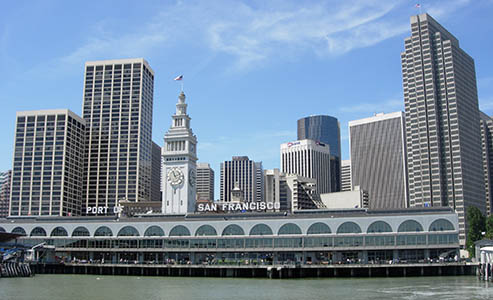While the Port of Oakland is recognized as a true "mega" ocean cargo gateway, neighboring Port of San Francisco was featured at a major cargo conference on the West Coast last month in Southern California.

The Port of San Francisco was featured at a major cargo conference on the West Coast last month. The historic San Francisco Ferry Building was mentioned as well as our ferry system, which carries nine million passengers every year. Photo by Joel Williams
By Patrick Burnson
Published: September, 2015
While the Port of Oakland is recognized as a true “mega” ocean cargo gateway, neighboring Port of San Francisco was featured at a major cargo conference on the West Coast last month in Southern California. Peter Dailey, the port’s deputy director of maritime, gave a compelling presentation on the importance of his “niche” gateway at a Senate Committee on Ports hearing in San Diego.
He not only noted the importance of having this alternative “working waterfront,” but also made mention of the port’s historic Ferry Building and our ferry system, which carries nine million passengers every year.
The video of his testimony, which is well worth watching, is available at www.sfport.com.
State Officials Push Transportation Funding
There was plenty of action in state government last month as well. Sacramento officials came to the Port of Oakland seeking support to fix ailing transportation infrastructure. Without road and other transport improvements, Governor Jerry Brown and Assembly Speaker Toni Atkins warned, California’s economy is at risk.
“It’s fundamental that California be able to move goods and people in a modern, efficient way,” Brown told an audience of 70 during a morning press conference at the Port of Oakland headquarters. “This is critical to California prosperity.”
The comments coincide with a special session of the state legislature currently looking at how to fund transportation improvements. The fixes would target roads, highways and transport infrastructure. “We can’t have a thriving economy if we can’t keep people and goods moving,” Atkins said.
Funding for everything from congestion relief to pothole repair is under discussion in Sacramento, the governor said. The outcome will be particularly important for the Port of Oakland, as the port handles 99 percent of the containerized goods moving through Northern California. Much of that trade is carried by trucks on roads leading in and out of the port.
“Our infrastructure is aging and in need of public and private investment to help ports and other parts of the supply chain remain competitive,” Board of Port Commissioners Vice President Michael Colbruno told the audience. “We’re hopeful that the legislature is on a path that again prioritizes freight and transportation solutions in its special session.”
Oakland Considers Adding Saturday Operations
Cargo operations at the Port of Oakland, meanwhile, just keep getting bigger . . . and faster.
The port wants Saturday operations at its marine terminals, but it has two big concerns. That was the message Executive Director Chris Lytle delivered this week in a recent letter to the Federal Maritime Commission. “The port strongly supports additional gate hours,” Lytle said. “There are, however, several points for the commission to consider.”
The port boss said opening terminal gates on Saturdays could ease congestion and improve efficiency in Oakland. He added, however, that there are caveats: First, a labor shortage that has slowed vessel loading operations must be resolved; and second, the fees to fund Saturday operations must be reasonable and used exclusively for those operations.
Lytle’s letter was in response to plans by Oakland marine terminal operators to open their gates on Saturdays. The proposal, currently under commission review, could ease weekday terminal crowding by adding a sixth day of work.
Oakland terminals are already open on weekends for vessel operations, but rarely for other activities. The new arrangement would open terminals every Saturday for full operations, including gate entry. That would enable harbor truckers to pick up containerized imports for delivery, drop off exports or return empties.
The port doesn’t operate marine terminals. But it favors Saturday hours as part of a broader plan it developed to speed up cargo delivery. That plan includes offsite locations to collect empty containers and a common pool of container chassis for harbor truckers.
A labor shortage that has reduced productivity this summer is being addressed, the port said. It added, however, that more dockworkers are needed to ensure Saturday operations are successful. The port also called for a review of the Saturday program after one year of operation.
Patrick Burnson is the past president and current board member of the Pacific Transportation Association, based in San Francisco. www.pacifictrans.org

